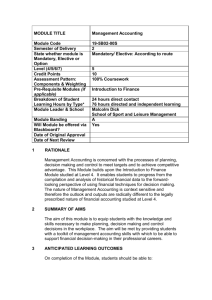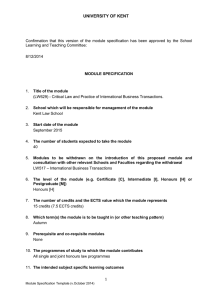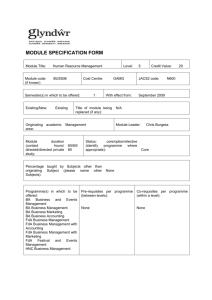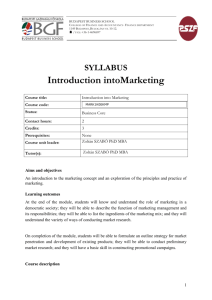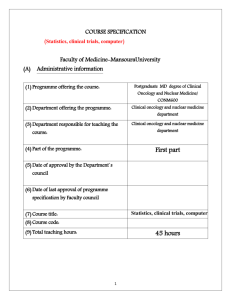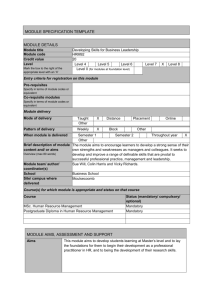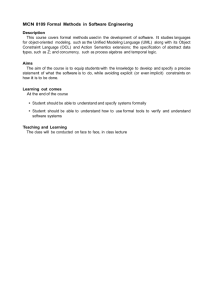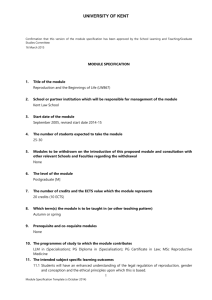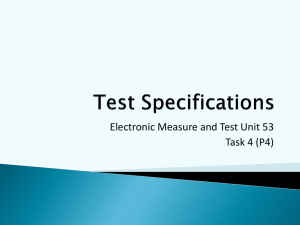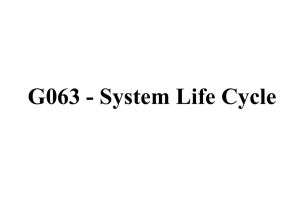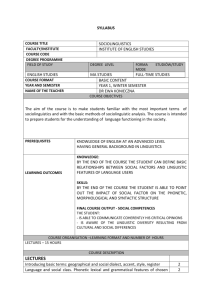International Financial Reporting (CB8017)
advertisement
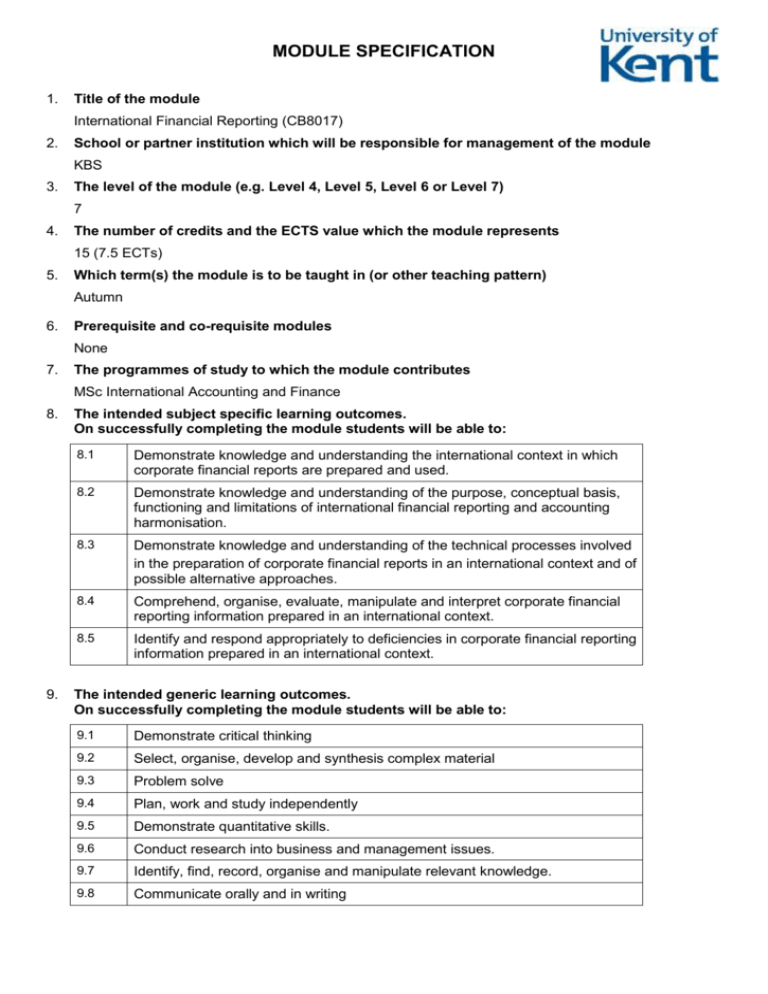
MODULE SPECIFICATION 1. Title of the module International Financial Reporting (CB8017) 2. School or partner institution which will be responsible for management of the module KBS 3. The level of the module (e.g. Level 4, Level 5, Level 6 or Level 7) 7 4. The number of credits and the ECTS value which the module represents 15 (7.5 ECTs) 5. Which term(s) the module is to be taught in (or other teaching pattern) Autumn 6. Prerequisite and co-requisite modules None 7. The programmes of study to which the module contributes MSc International Accounting and Finance 8. 9. The intended subject specific learning outcomes. On successfully completing the module students will be able to: 8.1 Demonstrate knowledge and understanding the international context in which corporate financial reports are prepared and used. 8.2 Demonstrate knowledge and understanding of the purpose, conceptual basis, functioning and limitations of international financial reporting and accounting harmonisation. 8.3 Demonstrate knowledge and understanding of the technical processes involved in the preparation of corporate financial reports in an international context and of possible alternative approaches. 8.4 Comprehend, organise, evaluate, manipulate and interpret corporate financial reporting information prepared in an international context. 8.5 Identify and respond appropriately to deficiencies in corporate financial reporting information prepared in an international context. The intended generic learning outcomes. On successfully completing the module students will be able to: 9.1 Demonstrate critical thinking 9.2 Select, organise, develop and synthesis complex material 9.3 Problem solve 9.4 Plan, work and study independently 9.5 Demonstrate quantitative skills. 9.6 Conduct research into business and management issues. 9.7 Identify, find, record, organise and manipulate relevant knowledge. 9.8 Communicate orally and in writing MODULE SPECIFICATION 10. A synopsis of the curriculum The module covers both the infrastructure of international financial reporting and selected technical issues critical in preparing and using corporate financial reports in an international context. It looks at international harmonisation and convergence and the development of international accounting standards. The theory of international financial reporting is discussed and illustrated by an examination of various technical issues. The constraints inherent in reporting to international financial markets, and the needs of international financial analyst, are explored. 11. Reading List (Indicative list, current at time of publication. Reading lists will be published annually) Alexander, D., Britton, A. and Jorissen, A. (2011), International financial reporting and analysis (5th edition), Andover: Cengage Learning Deegan, C. and Ward A.M. (2013). Financial accounting and reporting an international approach. New York: McGraw-Hill Elliott, B. and Elliott, J. (2012), Financial accounting and reporting (15th edition), Harlow: Financial Times Prentice Hall Melville, A. (2011). International financial reporting a practical guide. (3rd edition). Harlow: Financial Times Prentice Hall Nobes, C. and Parker, R. (2010), Comparative international accounting, (11th edition) Harlow; Financial Times Prentice Hall Roberts, C., Weetman, P. and Gordon, P. (2008), International financial accounting: A comparative approach, (4th edition) Harlow: Prentice Hall/Financial Times 12. Learning and Teaching methods There will be 36 hours of contact time, comprising a mixture of lecture led presentations and workshops together with seminars, spread over 12 weeks. Students will have 2 hours lectures and 1 hour seminar each week. During the lectures students will be introduced to the new material in the area of international financial reporting. Seminars will include small group discussions of material and theoretical concepts presented in the lectures. 13. Assessment methods. This module is assessed by a 2 hour end of year exam (60%) and two coursework assignments (40%). The coursework assignments will be an in class test (20%) and an individual essay (20%) with a maximum of 1800 words. 14. Map of Module Learning Outcomes (sections 8 & 9) to Learning and Teaching Methods (section12) and methods of Assessment (section 13) Module learning outcome 8.1 8.2 8.3 8.4 8.5 9.1 9.2 9.3 Learning/ teaching method Hours allocated Lectures 24 x x x x x x Seminars 12 x x x x x x x x Independent study 114 x x x x x x x x Assessment method 2 Module Specification Template (September 2015) 9.4 9.5 9.6 9.7 9.8 x x x x x x x x x x MODULE SPECIFICATION Exam – 2 hour unseen 60% x x x x x x x x In class test 20% x x x x x x x x x x Essay – 1800 words 20% x x x x x x x x x x x x x x x x x x x 15. The School recognises and has embedded the expectations of current disability equality legislation, and supports students with a declared disability or special educational need in its teaching. Within this module we will make reasonable adjustments wherever necessary, including additional or substitute materials, teaching modes or assessment methods for students who have declared and discussed their learning support needs. Arrangements for students with declared disabilities will be made on an individual basis, in consultation with the University’s disability/dyslexia student support service, and specialist support will be provided where needed. 16. Campus(es) or Centre(s) where module will be delivered: Canterbury FACULTIES SUPPORT OFFICE USE ONLY Revision record – all revisions must be recorded in the grid and full details of the change retained in the appropriate committee records. Date approved Major/minor revision Start date of the delivery of revised version Section revised 18/01/2016 Minor Sept 16 13 3 Module Specification Template (September 2015) Impacts PLOs( Q6&7 cover sheet)
